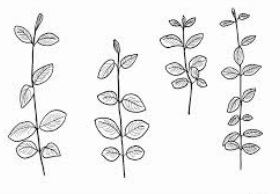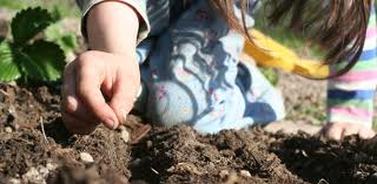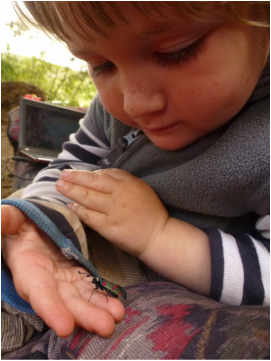The roots - resources, boundaries, research and observations
My resources
- Books - I have many books connected with this subject filled with wisdom. And fortunately I feel very motivated to read at the moment. Click here for the book list
- Personal experience - as I worked previously as a teacher, I spent lots of time spent developing lesson plans and so I have some feeling of what may work in a group situation. I have also previously spent time interpreting and adapting primary school curriculum's, which may come in handy to fit children's permaculture classes into the framework of the UK curriculum. This could enable the outcomes of this work to be available to children in mainstream education.
- Parenting - I have a 4 year old son who is my teacher and guide into the magic of childhood, and we can joyfully explore exciting and alternative childhood education together. I'm also looking into natural parenting websites and magazines. There are some based in the UK that I find really inspirational and give me loads of ideas on creative and meaningful things to do with children. Two of these are Juno and The Mother magazines. I've read them sporadically in the past but I've just subscribed to both and I'm going to be continually looking into these as part of my research. Two nice websites to look at are the Natural Parents Network, and also The Green Parent.
- My community - some of my friends and their families are taking part in forest school and similar trainings, and many of them live creative natural, beautiful lives with their children. These are a source of inspiration and wisdom for me, and I hope to be able to remain in closer contact with them for the future. I also recognise that there are many others in my community that are doing amazing things with children's education, and I would like to start tapping into other groups and networks like this.
- Opportunities for learning in UK- just at this moment I am in the process of transferring my family to living mostly within the UK for the next while. And suddenly lots of avenues for learning and study have become available to me. After being so remote and isolated in rural Spain I am so excited at the idea of becoming involved in so many things! Never have I had so much energy for being social and involved in my community. This is a good time to be here.
- Teacher training course coming up - I have booked myself onto a permaculture teacher training to be held in Lincoln this coming June. I've been wanting to take one of these courses for a long time but now it really feels like the perfect time to expand my abilities as a teacher, as my heart and head are very much in this at this moment.
- Finally some good childcare - looking for childcare with our move to Sheffield coming up, I have finally come across a kindergarten that both Ohli and I are excited about. Run connected to a scout hut, Wild about Play has it's base camp in the bend of a river where mice and kingfishers come out to join in the breakfast circle. The teachers are all forest school trained, there are tree houses and mud kitchens, and when we recently went to visit the children were making bee houses from bamboo. They even have chickens and rabbits to take care of. So I can happily work and study away whilst Ohli is spending meaningful time out in nature with others.
My present boundaries
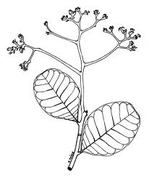
- I recognise my own personal boundaries of my education and experience in this area. I would like to consider some more guided learning in some of the things I am exploring, and also some more hands on experience of working with both children and adults in permaculture ways. I have some opportunities for volunteering and co-teaching coming up in the next few months which should help me a lot with this.
- My lifestyle in Spain means that connecting with others is difficult, due to language barriers, lack of internet/power/reliable phone line, and also due to the amount of work necessary every day on the land to survive there. This is a definite boundary when it comes to organising course plans, or pretty much anything else!. As the location is very rural we also have difficulty encouraging people to come out to the land for workshops or visits, although this will most likely improve over time. And without many volunteers, getting the land ready for hosting courses will take a longer time. I am considering taking some time off the land and moving back to the UK for a while, which would help a lot in supporting new projects and plans, including my diploma work.
I've been thinking that it will be necessary to organise lesson plans into suitable age ranges. Before this I would like to look at what stages of development each phase of childhood associates with. I know I have read about these phases in the past, most specifically in the teachings of Rudolf Steiner.
I really like the way that Rudolf Steiner deals with the different stages of childhood and so I have been looking again into the way he describes each phase, so it can help me to develop age appropriate activities. I've written some more about this below.
I really like the way that Rudolf Steiner deals with the different stages of childhood and so I have been looking again into the way he describes each phase, so it can help me to develop age appropriate activities. I've written some more about this below.
Holistic education: The work of Rudolf Steiner
"The need for imagination, a sense of truth and a feeling of responsibility — these are the three forces which are the very nerve of education." Rudolf Steiner
I have had a real interest in Steiner education since before I became a parent 4 1/2 years ago. His understanding and interpretation of the stages of childhood, and of how to best nurture and develop a growing child feel so inherently right to me, and I've seen the positive effect that Steiner education has had on children around me with my own eyes. Sadly my son and I have never lived close enough to a Steiner kindergarten for him to have any regular contact with one, a consequence of the nomadic and rural lifestyle. But I have been waiting for the opportunity to spend some time delving further into the teachings of Steiner so that I can use this to positively influence the daily life of my family. So it looks like this is my chance.
I have had a real interest in Steiner education since before I became a parent 4 1/2 years ago. His understanding and interpretation of the stages of childhood, and of how to best nurture and develop a growing child feel so inherently right to me, and I've seen the positive effect that Steiner education has had on children around me with my own eyes. Sadly my son and I have never lived close enough to a Steiner kindergarten for him to have any regular contact with one, a consequence of the nomadic and rural lifestyle. But I have been waiting for the opportunity to spend some time delving further into the teachings of Steiner so that I can use this to positively influence the daily life of my family. So it looks like this is my chance.
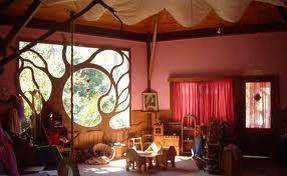 A typical Steiner classroom
A typical Steiner classroom
Steiner focused on Anthroposophy; understanding the whole human being as body, soul and spirit, in his words; "A recognition of our essential humanity". He defined three golden rules for teachers:
"To receive the child in gratitude from the world they come from, to educate the child with love, and to lead the child into the true freedom which belongs to man."
‘We do not educate the child for the age of childhood, we educate him for his whole earthly existence.’
Rudolf Steiner. The Roots of Education, 17/04/1924
"To receive the child in gratitude from the world they come from, to educate the child with love, and to lead the child into the true freedom which belongs to man."
‘We do not educate the child for the age of childhood, we educate him for his whole earthly existence.’
Rudolf Steiner. The Roots of Education, 17/04/1924
Steiner teaches that there are three main phases of the development of the growing child, each of approximately seven years. The understanding of each of these phases "Indicates the optimum way to support and foster the healthy growth of children in all aspects – physically, socially, emotionally and intellectually." *
I've made an overview of the three phases along with a collection of lectures on the changes and stages of consciousness of the growing child on a separate page. You can find that at this link: *More on Steiner philosophy.
I've made an overview of the three phases along with a collection of lectures on the changes and stages of consciousness of the growing child on a separate page. You can find that at this link: *More on Steiner philosophy.
The importance of nature connection
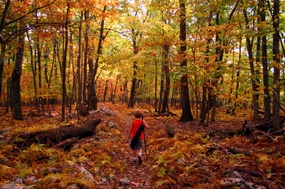
One of the books that is having a huge impact on me right now is Last child in the woods, by Richard Louv. He discusses how children in todays world suffer from what he calls 'Nature deficit disorder'. This book is really speaking to me, giving lots of food for thought about the modern world around us and the impact this disconnection to nature is having on our children. Another is The Coyote's Guide to Connecting with Nature. This amazing book is filled with ideas of re-inspiring children into the great outdoors and is filled with activities that you can do together.
I feel ever increasingly that one of the most important things to bring out in children is their connection to the natural world around them. As modern lifestyles bring us further away from nature, with more time spent indoors, surrounded by technology, time spent in cars, and moving forever closer to a consumerist lifestyle with our happiness tied closely with acquiring new objects to play with, there is no time or space left for free play and imagination. The sense of well-being and calmness that come from spending time in nature is being lost; along with the health benefits from being outdoors and using our bodies in an active way, and the recognition and deep, inherent understanding that we are a part of nature and nature is a part of us.
Without knowing the natural world around us we forget it's importance to our very existence. And what we don't know we can't understand, so know how to live in harmony with. Our next generations will have the task of restoring our culture and community to one that not only lives within our means but beyond this. We don't only need sustainability now, but to reconstruct entirely our vision of what it means to not only be a part of our community, but of our greater ecosystem - the earth that we inhabit.
I feel ever increasingly that one of the most important things to bring out in children is their connection to the natural world around them. As modern lifestyles bring us further away from nature, with more time spent indoors, surrounded by technology, time spent in cars, and moving forever closer to a consumerist lifestyle with our happiness tied closely with acquiring new objects to play with, there is no time or space left for free play and imagination. The sense of well-being and calmness that come from spending time in nature is being lost; along with the health benefits from being outdoors and using our bodies in an active way, and the recognition and deep, inherent understanding that we are a part of nature and nature is a part of us.
Without knowing the natural world around us we forget it's importance to our very existence. And what we don't know we can't understand, so know how to live in harmony with. Our next generations will have the task of restoring our culture and community to one that not only lives within our means but beyond this. We don't only need sustainability now, but to reconstruct entirely our vision of what it means to not only be a part of our community, but of our greater ecosystem - the earth that we inhabit.
|
We have a responsibility now to raise our children to become guardians of the future. And it is clear from looking around us that mainstream education, advertising and lifestyle choices of the masses are taking us in the wrong direction. That's why I feel that nature and permaculture based education is so important for both children and adults. If we can ingrain within us all a strong sense of place in the natural world with all her elements and cycles, then we will have a good chance of raising children who can live with a respect, passion and deep understanding for the important work that lays ahead of us all.
The ethics of permaculture act as a framework for childhood education. Earth care - guiding our children to care for the Earth will be fundamental to their ability to flourish in the future. People care - teaching them ways to care for each other and be responsible, considerate members of a conscious community. And fair shares - learning to live within their ecological means, something our generation now has to work very hard to remember how to do. |
In summary of my research and reading
I could quite easily (and quite probably) spend the rest of my life finding more and more inspiring books and websites about children' holistic development and ways to guide them into a life filled with permaculture. But from my past few months of reading amazing natural parenting/alternative education books, for the sake of this project I am developing a clear understanding of the physical and emotional environment I would like to create for my workshops.
- Process oriented activities. This is where the true learning happens, the outcome is secondary (Often opposite to the mainstream that they may be used to).
- Allowing freedom within clear boundaries. Don't stop them from doing things that excite or interest them - just do it with them.
- Remaining aware of holistic development - each activity can have so many positive outcomes!
- Always, always having respect and appreciation for each child's unique style of learning and communicating
- The main task involved will be creating and holding a space for the magic and untamed, raw creativity of childhood to be allowed to blossom and flourish with ease.
- Inspire, excite, light the flames for the future...
- Should we not be the revolutionaries and the creators of change? We should be, and they need to be.
'Living with your child so that he is deeply and quietly glad that he is who he is gives him a priceless legacy: strength to meet stress, and courage to become committed, responsible, productive and creative - a fully human person.'
From 'Your child's self esteem', by Dorothy Corkille Briggs
"Build your children into little bliss bombs, and watch reality shift and alter as they go out into the world unwavering in their love and joy and hope and truth"
Kate Magic Wood, Raw food author, Juno issue 21
From 'Your child's self esteem', by Dorothy Corkille Briggs
"Build your children into little bliss bombs, and watch reality shift and alter as they go out into the world unwavering in their love and joy and hope and truth"
Kate Magic Wood, Raw food author, Juno issue 21
jump onto the next page here
